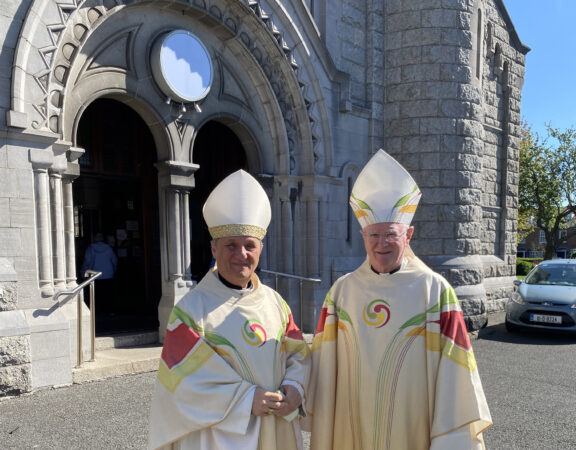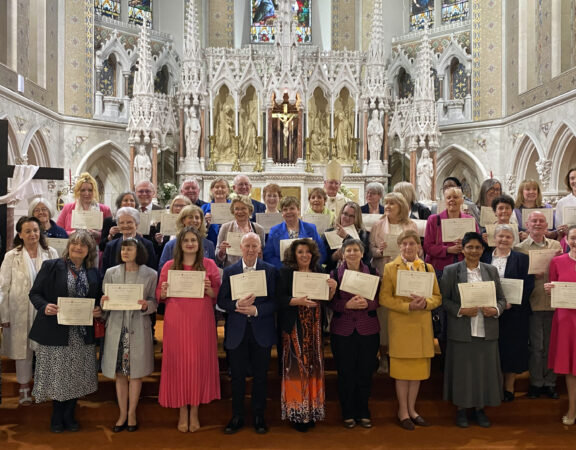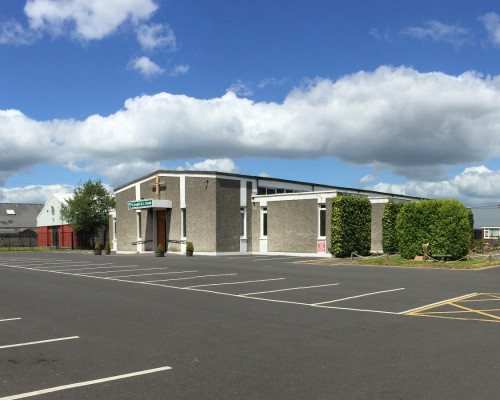First Sunday of Advent 2015
ANNUAL MASS FOR THE CO-WORKERS OF ACCORD DUBLIN
Homily notes of Archbishop Diarmuid Martin
All Hallows College, Dublin, 28th November 2015
“The Gospel that we have just heard was written by Saint Luke for the early Church where – just one generation after the resurrection of Jesus – Christians were already slipping back into their old, ordinary, coarse ways. “Watch yourself”, Saint Luke says, “or your heats will become coarsened”; you should live each day in such a way that when Jesus comes you can “stand erect and hold your heads high”.
We also face that same temptation of slipping back into our old ways or of becoming lax or indifferent in our faith and life. This has happened right throughout the history of the Church and indeed the history of salvation. The history of marriage in the course of salvation history, for example, was marked by constant failure and infidelity to God’s plan by his own people but above all by the continual fidelity of God to those who fall. God in his mercy never ceases to accompany us and call us to conversion and renewal.
The Book of Genesis explains God’s plan for marriage as a unique union between a man and a woman, so total and intimate that because of it a man must leave his father and mother in order to be united with his wife.
However, sin entered the history of humanity and it brought with it the reversal of the basic characteristics of God’s plan. Polygamy, divorce, and submission of a wife to her husband became not just common place, but were even institutionalized in sectors of Jewish society. One of the bishops in my working group at the recent Synod of Bishops recalled that, at the time of Jesus, divorce was possibly more common in society as it is our times and that a woman for the smallest excuse could simply be ditched and abandoned by her husband.
How does God respond? Through the prophets God constantly called for a change from this situation of sin and for the re-establishment of the original dignity of marriage. The prophet Hosea recalled how the union and love between husband and wife could be understood as reflection of God’s love for his people. The Song of Songs gives a unique reflection on human love as a dialogue between two lovers praising each other, yearning for each other, and rejoicing in sexual intimacy. God’s plan for marriage and the family is not a negative one.
Jesus in his ministry teaches brings the biblical teaching on the dignity of man and woman in marriage and the family more clearly into focus. Jesus Christ was born into a human family. At a time when it was considered inappropriate for a Rabbi even to speak with a woman that he did not know, Jesus dared to speak to a woman, who was a Samaritan – an “excommunicated” and a renowned sinner – something even more scandalous. To a woman who was brought before him prior to her being stoned for having committed adultery, he said: “I do not condemn you. Go and sin no more.”
Jesus was immersed in the realities of the world of his time. He knew of the failures and infidelity of many and how difficult it could be to live his ideals. He remained close to those who failed, but he did not condemn. He dirtied his hands daily through human work and toil, but he did not fill his hands with stones to throw at those who fail.
Those of us who work in Church services to support marriage and the family have to learn day by day to understand our work as a call to mirror God’s patience and mercy.
We are called to sustain married couples in living their Christian marriage as a lifelong covenant of love and how its permanence until death is a sign of God’s faithfulness to his people. God, we can say, recognizes the image of Himself in the faithfulness of his spouses and confirms with his blessing this fruit of his mercy.
God recognises the image of himself in the realities of married life. Very rarely do we hear sermons which stress how the real daily love of spouses is the foundation of their holiness. Rarely do we hear how the responsible sexual love of husband and wife can be an expression of communication and tenderness and intimacy and often of reconciliation and forgiveness and thus shares in and reflects tender love of God. Very rarely are parents reminded of how their constant and patient love of their children and their self-giving for them are the true building blocks of their holiness.
All of us need God’s mercy. In many societies today there is a sense of self-sufficiency, whereby people feel that they have no need of mercy and no awareness of their own sinfulness. At times this is due to an inadequate catechesis on sin. Sin is not about breaking rules; it is a wounding of our relationship with a loving God and with each other, a wound which can be healed only through the saving power of God’s mercy. On the other hand in Ireland there is also the inheritance of a vision of a severe judgmental God and a tendency for us to put our own human limits on God’s mercy.
God never gives up on his mercy. It is mercy which reveals God’s true face. God’s mercy reaches out to all of us, especially to those who suffer, those who are weak, and those who fail. Pope Francis stresses that God’s anger lasts for a moment, but his mercy lasts forever.
Advent is a natural time to think of the future as a future of hope because we know, even in the darkest moments of life, the Lord comes to be with us, to accompany us and to bring us deliverance as we wait for the ‘blessed hope’.”









